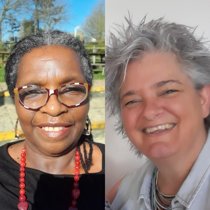As the Practice Supervisor Development Programme (PSDP) draws to a close, we reflect on its evolution over the four years. What is apparent is our experience of our own individual transformation: while developing the programme and learning alongside our peers and over 2000 PSDP participants who have joined us on the journey. The southern African term ‘Ubuntu’ comes to mind, which is sometimes translated to mean ‘I am, because we are’ and is a concept capturing the ethos of relationship which has been at the heart of the programme from the beginning.
Evolution of the programme design
The PSDP has been developed with the sector in a number of ways and a central mechanism for this has been the Community of Practice of programme facilitators, who met for the first time in July 2018. We reflect on this time with fondness, recalling the enthusiasm and ambition in the room, alongside some trepidation about the enormity of the task ahead at that embryonic stage.
It was here where the initial iterations of the programme content began, which soon emerged into rich, dense materials, spanning a range of theoretical disciplines, and supported by contemporary and more traditional evidence frameworks. The pilot and regional deliveries in the autumn and winter of 2018 served to provide an opportunity for us to refine and co-create the feel of the programme alongside participants. This enabled us to really shine a light on the relational and experiential aspects of the programme, while embedding our own knowledge of the materials and experience of delivering the programme.
Evolution of context and pedagogy
The backdrop of the COVID-19 pandemic marked a significant turning point and critical moment in the delivery of the programme, with an implicit invitation to develop virtual pedagogy. We are grateful that, at this point in the journey, the facilitators had sufficiently internalised knowledge of the materials to put the majority of our energy into developing creative ways to use virtual teaching and learning methods.
By this time, the heart of the programme was established as a focus on relationship and connection – and this has remained at the centre of our pedagogical approach for online delivery over the remaining two years. And we have learned that virtual spaces do not have to be the opposite of relational ones! Our stance as ‘facilitators as learners’ encouraged us to model vulnerability and imperfection, which we have concluded are important leadership qualities to model within the social work profession.
This emotional positioning also enabled us to develop our courage and confidence in responding to the murder of George Floyd and the resurgence of the Black Lives Matter movement in 2020. These events compelled our community to reflect together and individually on the impact of systemic racism and social inequalities and as a programme, bring factors of anti-racist, anti-oppressive and anti-discriminatory supervision practice more intently to the surface. We approached this through strengthening our materials and providing additional (optional) learning opportunities to assist participants to embed this particular focus into their supervision practice.
We challenged ourselves as facilitators, while committing to finding ways of articulating our intentions and values in ways we had not done before, working with and through our own levels of emotion as well as power and privilege. This meant that when it came to teaching these topics or holding reflective 1-1 or group spaces, we could bring more of our true selves, encouraging participants to do the same. We are particularly proud of how these aspects of programme development have strengthened the delivery of the PSDP across all of its components, and continue to inform wider promotion of anti-racist practice in children and family services.
Evolving and learning with the sector
We have learned much about the daily realities of practice supervisors and managers and their teams by listening to and valuing stories of despair and triumph. We have heard about their exhausting experiences of juggling the excessive demands of their organisations with the ethical values of the profession, which supervisors often experience in conflict. Despite this, we also understand how supervisors have shown up in their roles and demonstrated a commitment to high quality social work practice, helping to develop this in their teams for the benefit of the children and families they serve.
Our learning from the sector resonates throughout the heart of the programme. This was particularly evident in the initial in-person delivery in hotels, which meant that practice supervisors were, literally, ‘cared for’; in the materials and the examples used to achieve a relevant and close connection between theory and practice; and through our teaching methods, where facilitators’ validation of the participants’ endeavours is demonstrated through compassion and sensitivity.
Evolving as facilitators
The community of facilitators for the PSDP came from different roles within academia, training and organisational consultancy, with one thing in common – we were all used to working on our own! Over the four waves of the programme, we have developed into a community of facilitators who have embedded relational practice through co-facilitating. This has felt like both a straightforward development, and it has had its challenges. We have had to learn to take a more collaborative stance, requiring us to reposition ourselves and our emotional connection to independence and more importantly vulnerability. It has entailed trusting others to share in the task: in the successes as well as in taking risks; being transparent and showing our ‘workings out’ (to each other as well as to participants) – therefore modelling how participants might do the same within their roles. This modelling has become a core value of the programme, where we aim to influence a parallel process within practice i.e., what happens relationally in one space plays out in another, with the aim of influencing social work practice through what is modelled in supervision.
As delivery leads of the programme, we feel privileged to have been part of such a collaborative, transformational and humanising project, which has served to build relational and emotional confidence in the profession. We are particularly thankful to our amazing group of facilitators and proud of all our participants, two of whom wholeheartedly sum up their learning and development experiences by saying:
‘Thank you for a programme of great learning, valuable companionship and tremendous hope for our profession’, and ‘the biggest thing for me that this programme brought is it made me fall in love with social work again!’




